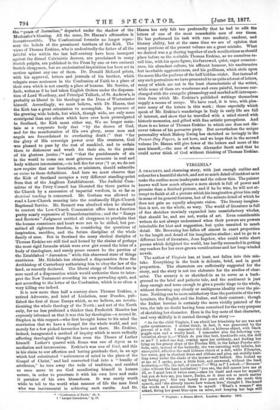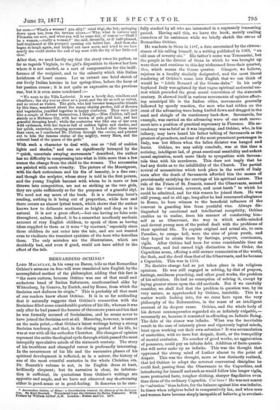VIRGINIA.*
A GRACEFUL and charming story, with just enough outline and colour for a beautiful sketch, and not so much detail of incident as to make the outline seem inadequate and the colour thin. The painter knows well how much oftener a mere sketch is full of power and promise than a finished picture, and if he be wise, he will not at- tempt to finish at all a picture which his imagination gives him only in some of its general features, but of the minute detail of which he does not gain an equally adequate vision. The literary imagina- tion is not, on the whole, so wary. The world of literature is full of fine sketches unwisely expanded into unsatisfactory wholes, that should be, and are not, works of art. Even considerable writers do not always understand when their powers are powers inimitable for hint and suggestion, but quite unsuited to much detail. Mr. Browning has fallen off almost in exact proportion to the length and detail of his imaginative studies ; and to go to a different level of literature, Jean Ingelow, who could write short poems which delighted the world, has hardly succeeded in getting any readers for her over-grown versifications and her long-winded novels.
The author of Virginia has, at least, not fallen into this mis- take. Everything in the book is delicate, brief, and in good proportion. The characters are sufficiently suggested for the story, and the story is not too elaborate for the studies of char- acter. The scenery is so sketched-in as to serve as a back- ground to the brief and pathetic tale, and the sentiment is just deep enough and terse enough to give a poetic tinge to the whole, without throwing any cloudy or ambiguous ideality over the pic- ture. Nothing can be more satisfactory than the portraits of the two heroines, the English and the Italian, and their contrast ; though the Italian heroine is certainly the more vividly painted of the two, the tale no doubt having been conceived for the very purpose of sketching her character. Here is the key-note of that character, and very skilfully is it carried through the story :— " As for the child Virginia, I am afraid her friendship for me was not quite spontaneous. I rather think, in fact, it was generated by the present of a doll. I remember the doll—a hideous object, with black goggle eyes and a woolly head. I remember also the following con-
versation about Which do you like best, bambinella min, the doll or me ?' I asked one day, coming upon her suddenly, and finding her lying on the grassy slope of the Pincian Hill, in the Infant Psyche atti- tude, only, instead of the butterfly, she was caressing with infinite, but unrequited, affection the said hideous object of a doll, while Filom6na, her nurse, gay in checked dross and ribbons and pins, sat stolidly knit- ting away under the shade of the terrace-wall behind. She looked up at me as I spoke, gave a little kick, and answered, without the least hesitation,—'Oh, the doll, of course Why so?' I asked.' Because' (also without the least hesitation) you see, the doll cannot love me at all, so I must love it twice over,—once for itself and once for myself; bat you do love me, you know, Dacko, so it does not so much matter my loving you.' She was barely five years old when she made this speech, and she already knows how women love,' thought L She heard the words as I muttered them to myself. What's a woman?' she asked, fixing her great blue eyes on mine, and keeping her legs still
* Virginia : a Roman &etch. London : Bentley. 1877. for once.—' What's a woman ? you silly!' cried Gigi, the boy, springing down upon her, from the terrace above.' Why, what la meimma and Filomena are now, and what you will be some day, of course.'—' Shall I be a woman,—really a woman?' she said, dreamily, as if half-pleased, half-frightened at the prospect opening out before her. And then she began to laugh again, and kicked out once more, and tried to see how nearly she could stroke the end of my nose with the tip of her little red shoe."
After that, we need hardly say that the story owes its pathos, so far as regards Virginia, to the girl's disposition to shower her love where it is not needed, as a sort of compensation for the indif- ference of the recipient, and to the calamity which this Italian lavishness of heart causes. Let us extract one brief sketch of our lively Italian heroine in her spring-time, before the hour of her passion comes ; it is not quite so expressive as the previous one, but it is even more condensed :—
" We went to the Villa Lndovisi. It was a lovely day, windless and cloudless; the sky was as clear as a jewel, and the air as soft as velvet, and as sweet as violets. The girls, who had become inseparable friends by this time, wandered about the sunny sloping garden, fall of flowers and vegetables, jumbled together in happy confusion. They were just like a couple of flowers themselves, I thought, —Miss Chilton, tall and stately as a Madonna lily, with her crown of pale gold hair, and her graceful drooping head ; while the contessina was like one of her own wild cyclamen, with her face so full of sudden lights and shades, and her quick, uncertain, swaying movements. I looked after them more than once, as I conducted Mr. Chilton through the casino, and pointed out to him the famous statue of the mighty, weary Mars, and the colossal head of the queen of the gods."
With such a character to deal with, one so "full of sudden lights and shades," and one so significantly betrayed by the " quick, uncertain swaying movements " described, the author has no difficulty in compressing into what is little more than a few scenes the change from the child to the woman. The accessories are painted with much vivacity. The picture of the Monsignore, with his dark enthusiasm and his fits of insanity, is a fine one ; and though the sculptor, whose story is told in the first person, and the young English baronet with whom he is more or less thrown into competition, are not so striking as the two girls, they are quite sufficiently so for the purposes of a graceful idyl. We need not say more of the book. It is a charming hour's reading, nothing in it being out of proportion, while here and there occurs an almost lyrical touch, which shows that the author knows how to delineate sentiment as bright and deep as it is natural. It is not a great effort,—but one having no false note throughout, unless, indeed, it be a somewhat needlessly sardonic account of rosy English children, to speak of them as having ideas supplied to them as it were " by contract," especially since these children do not enter into the tale, and are not wanted even to vindicate the transient cynicism of the hero who describes them. The only mistakes are the illustrations, which are decidedly bad, and even if good, could not have added to the effect of the tale.



































 Previous page
Previous page